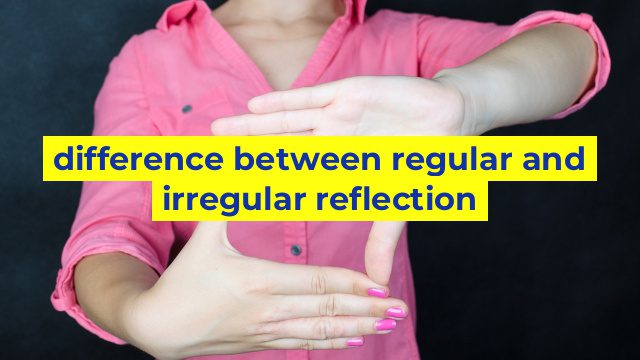Difference between Regular and Irregular Reflection
Reflection is the change in direction of a wavefront at an interface between two different media. The light rays can either undergo regular reflection or irregular reflection, depending on the nature of the surface.
Regular Reflection
Regular reflection occurs when light rays are incident on a smooth and polished surface, such as a mirror or a calm water surface. In this type of reflection, the incoming light rays bounce off the surface and create a clear, sharp image. The angle of incidence is equal to the angle of reflection, which leads to the formation of a predictable and regular pattern of reflection.
Regular reflection is also known as specular reflection. It is commonly used in optical devices, such as telescopes, eyeglasses, and camera lenses, where the quality and clarity of the image are of utmost importance.
Irregular Reflection
Irregular reflection occurs when light rays are incident on a rough and uneven surface, such as a paper or a brick wall. In this type of reflection, the incoming light rays bounce off the surface in different directions, creating scattered and diffused reflection. The angle of incidence and the angle of reflection are not equal, and the reflected light rays do not form a clear image.
Irregular reflection is also known as diffuse reflection. It is commonly observed in natural phenomena, such as the reflection of sunlight on the surface of a lake or the reflection of the stars on the surface of the ocean.
Conclusion
In conclusion, the difference between regular and irregular reflection is that regular reflection occurs on a smooth and polished surface, resulting in a predictable and regular pattern of reflection, while irregular reflection occurs on a rough and uneven surface, resulting in scattered and diffused reflection. Understanding these two types of reflection is essential in various fields, such as optics, physics, and photography.
Table difference between regular and irregular reflection
| Regular Reflection | Irregular Reflection |
|---|---|
| The reflected rays are parallel to each other | The reflected rays are not parallel to each other |
| The reflection occurs on a smooth and shiny surface | The reflection occurs on a rough and uneven surface |
| The image formed is clear and sharp | The image formed is blurry and distorted |
| Examples include a mirror, a still lake, or a polished metal surface | Examples include a textured wall, a crumpled piece of paper, or a tree trunk |
